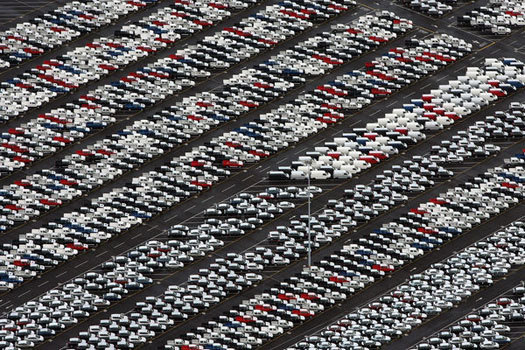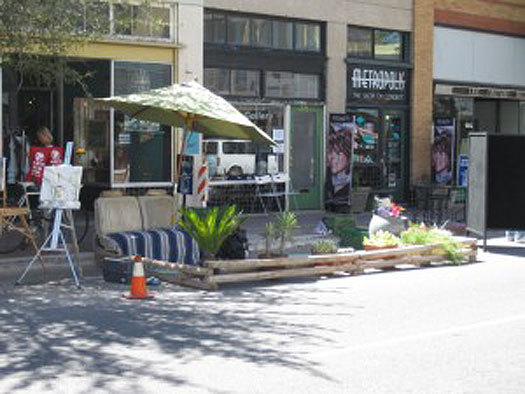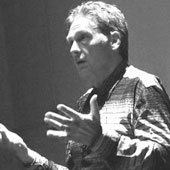
A study by Transportation Alternatives found that up to 45 percent of traffic in an area of Brooklyn was caused by cars circling the streets looking for parking. And in 2006, UCLA professor of urban planning Donald Shoup calculated that, within a year, vehicles searching for parking in a small business district in LA consumed 47,000 gallons of gas and produced 730 tons of carbon dioxide.
Faced by such shocking numbers, the default reaction of some people has been to look to technology for an answer. Let's invent a system, they resolved, that enables drivers to find open parking spaces without delay. A team at Rutgers University, for example, uses ultrasonic sensors, GPS receivers and cellular networks to find empty parking spaces; they relay this information to drivers using internet maps and navigation systems.
To optimize the search process, the Rutgers team placed ultrasonic sensors on the passenger-side door of three cars and used them to collect data on empty parking spaces over a period of two months during daily commutes through Highland Park, New Jersey. From this, the engineers developed an algorithm that used these ultrasound readings to reveal the number of available parking spaces with 95 percent accuracy. By combining this information with GPS data, they were able to produce maps of occupied and unoccupied spaces that were 90 percent accurate.
Enough, already!
While technically impressive, this is an absurdly over-complicated answer to the wrong question. In January 2011 alone, 4,474,00 cars were produced. We're adding 50 million cars a year to the 600,000,000 that are already here — and for 95 percent of the time, those 600,000,000 cars sit idle, wasting space.
Systems that help people locate not-yet-wasted parking places are a technological form of spatial cancer.
Small outbreaks of low-tech sanity do exist — like this one brought to you by the team at Tucson velo:



Comments [7]
02.01.11
12:22
So much of what is passed off as "green" these days is a desperate effort to maintain our present levels of energy consumption and their pollution-spewing ways of life - ala the Volvos cruising Park Slope with their green food co-op bumper stickers.
Cars remain the leading killer of young people in the country, kill more US citizens than guns do every year, and it doesn't matter if you're driving a hummer or a prius, either way you're hauling around a 4,000lb+ carapace that the rest of the non-driving world and the future is paying for in a many-layered pill of environmental and political pain (how many of those egyptians on the street are there, at least indirectly, because of all our gas tanks?)
Its time to kill the cars before they kill us.
02.01.11
12:27
02.01.11
02:41
02.02.11
08:16
I think the volume of cars is the problem, but it's much more complicated than you seem to articulate here. Isn't the Rutger's university team's response a low-cost answer to the problem you outlined at the beginning of the article?
The most efficient answer would be a large-scale system that reuses cars and routes them by computer; something that would reduce personal ownership and instead promote reuse and efficiency.
I mean, we're not going to solve the problem of over-population any time soon. It makes more sense to me to spend some time solving these problems — especially if we can solve them in efficient and cheap ways — and deal with the larger problems as we are able to.
Dealing with the larger problem of involves legislation, and that means that it becomes mired in politics, idiocy and the whims of big business. I mean, even if our politicians can get their act together and actually put policies in place, all too often they are too broad and do little to change things now.
02.04.11
01:49
improve the capacity of our world to support life, including our own? As I've written elsewhere, the real challenge is the transport intensity of an economy that must grow to survive.
Brekk, I offer the same reply to your very reasonable point: greater efficiency counts for little if it is achieved in an economy that is growing. To be candid the nature of our economy is not a problem that can be 'solved' by designers ; it will take a profound change of values at a societal level to achieve that.
02.08.11
01:39
And even if the economy were shrinking, and I were driving a electric hemp-composite city-car-share car back from dinner with my in-laws 15 miles away, I'd still like to look at my dashboard and see a map of open parking spaces in my vibrant and dense urban neighborhood. Considering most cars already have ultrasonic sensors in their bumpers, it's won't take much to inventory and share space availability.
Getting people in the habit of doing whatever they can to allocate resources efficiently is a good thing, isn't it?
03.04.11
06:10